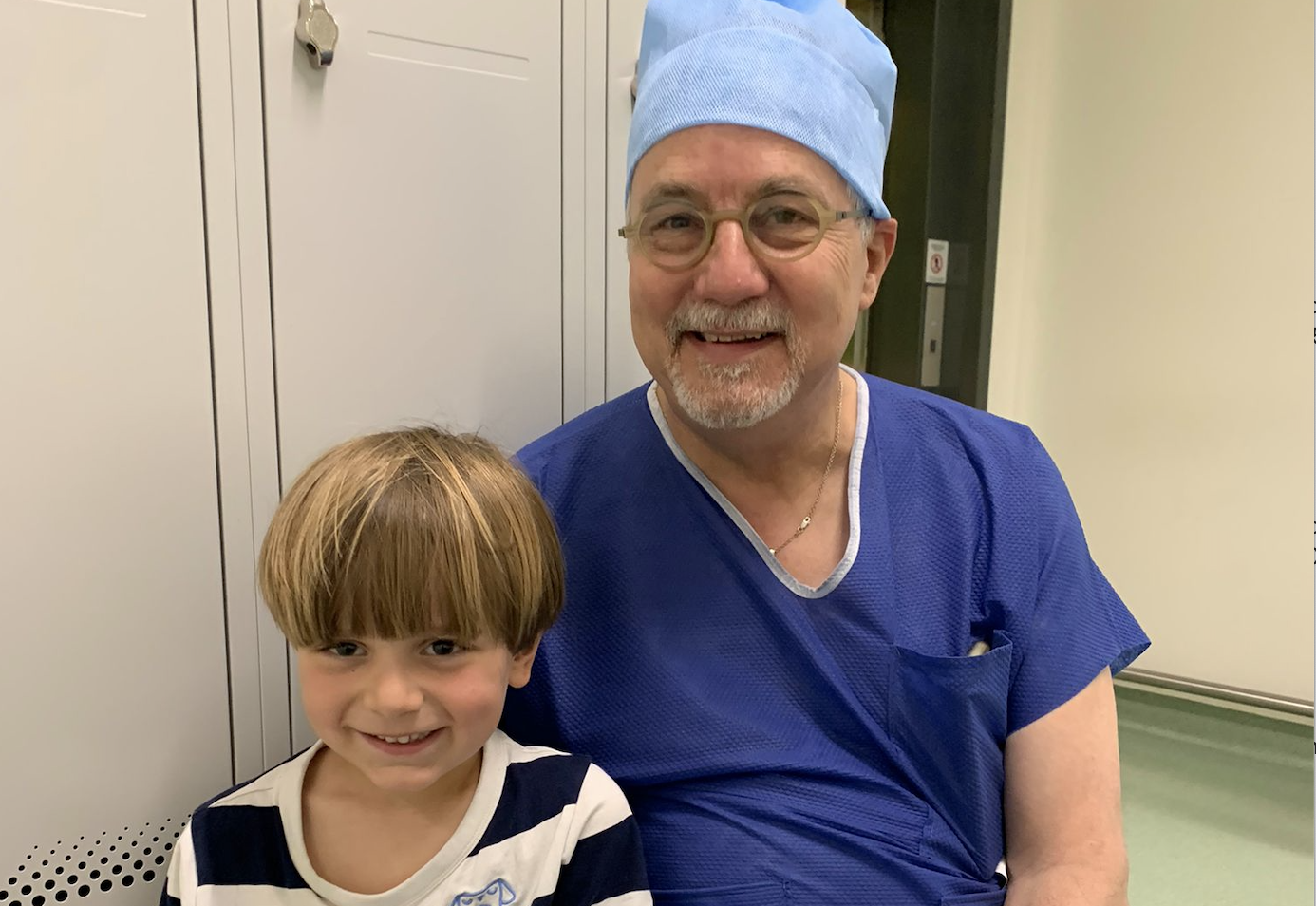
“Informing parents that their child has cancer is a huge challenge!”
Prof. Francis Munier has been a retinoblastoma specialist at the Hospital Ophtalmic Jules-Gonin in Lausanne, Switzerland, for more than 30 years and explains in this KAKS interview what parents need to know when their child is diagnosed with retinoblastoma.
How has retinoblastoma treatment evolved over the last 10 years?
There has been a change of attitude in the therapeutic approach to retinoblastoma due to the progressive switch from systemic (=intra-venous) to more targeted chemotherapy. This evolution was made possible by the sequential introduction of new routes of drug delivery directly into the eye and its various compartments, namely the intra-arterial, intra-vitreal and intra-cameral chemotherapies. This in turn has moved the frontiers of conservative management, expanding the indications for more advanced disease. This trend is illustrated by a 90% decrease in the primary enucleation rate of unilateral IIRC group D retinoblastoma in Lausanne from >60% to 5%.
Another source of positive evolution is the implementation of new imaging tools in the operating theater, such as optic coherence tomography (OCT), which has allowed significant improvements in the conservative management by allowing earlier detection of relapse threatening either the optic head or the macula.
What are the biggest achievements from your point of view?
The complete eradication of external beam radiotherapy is certainly the biggest achievement, followed by the significant decrease in the use of systemic first line chemotherapy.
How important is it for parents to seek a second opinion when their child is diagnosed with RB?
I think that a second opinion should always be offered to parents whenever the indication for upfront (= primary) enucleation is debatable or challenged by the parents, since consensual criteria for primary enucleation are still unavailable. This in contrast with secondary enucleation (after failure of conservative therapy), for which a position paper on behalf of the European Retinoblastoma Group was published in 2021, distinguishing absolute and relative indications. A similar paper is expected in the near future regarding primary enucleation in order to make a distinction between relative and absolute indications to remove the eye.
This said, our role is also not to delay decision-making beyond 7 to 15 days.
How much influence can parents have on their child’s treatment and what crucial questions should they ask?
Most important is to follow the treatment planning and to take precautions against infectious diseases by limiting child’s exposition, especially during the initial phase of treatment.
The most crucial questions in my view are always related to life prognosis and the influence of treatment strategy on the risk of metastases.
What is your most precious advice to them?
First of all, I don’t recommend searching the internet, where a flow of unfiltered information can only lead to overwhelming confusion.
No doubt the diagnosis of retinoblastoma is heartbreaking news, but passed the initial shock of the announcement of eye cancer, parents need to know that the overall survival is exceptionally good compared to other pediatric cancers. This remains true as long as the first line treatment, conservative or not, is not delayed. Whenever conservative management is preferred, eye preservation is not only very high even in advanced and bilateral cases, but also associated with good vision in the vast majority of them in at least one eye. In advanced retinoblastoma, it is important to inform the parents that the active phase of treatment can last up to a year, with monthly examinations and treatment under anesthesia. Decision to stop therapy can be decided at any time without increased risk for metastasis, provided that subsequent surgery to remove the eye is not delayed.
How important is it to decide together as a team with pediatric oncologists?
The management of retinoblastoma is multidisciplinary in nature. The decision-making should reflect this and involve the elaboration of a consensual strategy between pediatric and ocular oncologists. It is normal that differences of opinion may occur among the team, but these should be resolved before talking to the parents.
Why can treatment suggestions be different in different centers?
The recruitment area of each center varies with local, national and international referral patterns stratifying centers into secondary, tertiary and quaternary levels of care. These centers will differ from one another by the size and composition of the multidisciplinary team as well as the sophistication of their technological platform. Another potential source of divergent opinions between centers comes from the collaboration mode between onco-pediatricians and ocular oncologists.
Is the preservation of the eye always to be prioritized or which other factors have to be considered in a decision?
The general trend in ocular oncology is clearly to be less mutilating, by keeping both eyes without jeopardizing the so called “state of metastatic grace”. In other words, preservation of the eye can be decided as long as survival is not compromised.
Have you experienced very unexpected outcomes (both positive and negative) in the treatment of small RB patients? Which patients do you remember most?
Despite more than 30 years’ experience, I still witness paradoxical or counterintuitive responses to treatment, or unexpected tumor behavior.
I have had several instances of patients where an initial unfavorable response to treatment unexpectedly evolved into complete remission. Inversely, I have seen patients with prolonged tumor activity, relapsing up to 6 years after the last treatment, but fortunately such observations are really exceptional.
Regarding the second question, my first thoughts go to patients I have treated from diagnosis and who later consulted for their own children, whether affected or not. They survived their condition and founded their own family, thus continuing the cycle of life like any other person.
You treat young children with cancer, but somehow also always the whole family – is that more than an ophthalmologist usually has to do and how do you manage that?
The management of a patient affected with retinoblastoma and his or her family goes far beyond the role of an ocular oncologist. The role of the whole team is crucial and each member contributes to the final outcome of the patient, whether successful or not.
Is that perhaps also what makes your job so special and fascinating?
There is an infinite variety in the circumstances, both familial and medical, in every child we treat. Cancer is hard announcement to make, particularly in a child, and the trust that is laid in us to provide the best possible outcome is a very precious gift. It is why taking care of patients and families struggling against retinoblastoma cannot be compared to any other job, nor can it be limited to the search of a cure. It is like embarking on a boat for a long-lasting journey, where the path to success depends not only on the experience of the captain and crew, but also on the active participation of the passengers and the quality of the relationship between all.
Anything you would like to say parents whose child has just been diagnosed with retinoblastoma?
Firstly, I would congratulate the parents, on their recognition of an ocular problem and often perseverance in bringing their child to a specialized center. In many cases, in particular for those not fortunate enough to be living in more highly developed countries, the path to finding the proper care for their child may be long and arduous.
Secondly, not to panic, to know that both life and eye survival is extremely high.
Thirdly, there may be a sense of culpability which should be vigorously discarded, since the parents are never at fault. Now there may be a legitimate worry that future children may also develop the disease. In this respect genetic analysis will be undertaken to determine any risk and provide help with the family planning.
GERMAN TRANSLATION:
“Eltern darüber zu informieren, dass ihr Kind Krebs hat, ist eine riesengroße Herausforderung!”
Prof. Francis Munier ist seit über 30 Jahren RB Spezialist am Hospital Ophtalmic Jules-Gonin in Lausanne, Schweiz, und erklärt im KAKS Interview, was Eltern wissen müssen, wenn ihr Kind die Diagnose RB erhält.
Wenn Eltern die Diagnose RB für ihr Kind erhalten – was ist Ihr wertvollster Rat an sie?
Zunächst einmal empfehle ich nicht, das Internet zu durchsuchen, wo eine Flut von ungefilterten Informationen zu absoluter Verwirrung führen kann.
Zweifellos ist die Diagnose Retinoblastom eine traumatische Nachricht, aber nach dem ersten Schock müssen die Eltern wissen, dass die Gesamtüberlebensrate im Vergleich zu anderen Kinderkrebserkrankungen außergewöhnlich gut ist. Natürlich nur solange die Diagnose und die Behandlung rechtzeitig erfolgen.
Wie wichtig ist es, gemeinsam im Team mit pädiatrischen Onkologen zu entscheiden?
Die Behandlung des Retinoblastoms ist von Natur aus multidisziplinär. Die Entscheidungsfindung sollte dies widerspiegeln und die Ausarbeitung einer einvernehmlichen Strategie zwischen pädiatrischen und okulären Onkologen beinhalten. Es ist normal, dass es innerhalb des Teams zu Meinungsverschiedenheiten kommen kann, aber diese sollten vor dem Gespräch mit den Eltern geklärt werden.
Warum können die Behandlungsvorschläge in verschiedenen Zentren unterschiedlich sein?
RB Zentren unterscheiden sich voneinander durch die Größe und Zusammensetzung des multidisziplinären Teams sowie durch die vorhandenen technischen und medizinischen Möglichkeiten. Dadurch ergeben sich unterschiedliche Beghandlungsoptionen.
Wie wichtig ist es also für Eltern, eine zweite Meinung einzuholen?
Ich denke, dass den Eltern immer dann eine zweite Meinung angeboten werden sollte, wenn die Indikation zur primären Enukleation (= Augenentfernung) vorliegt oder von den Eltern in Frage gestellt wird, da konsensfähige Kriterien für die primäre Enukleation noch nicht vorliegen. Dies steht im Gegensatz zur sekundären Enukleation (nach Versagen der konservativen Therapie), für die 2021 ein Positionspapier im Namen der European Retinoblastoma Group veröffentlicht wurde, in dem absolute und relative Indikationen unterschieden werden.
Haben Sie bei der Behandlung von kleinen RB-Patienten sehr unerwartete Krankheitsverläufe erlebt?
Trotz meiner mehr als 30-jährigen Erfahrung erlebe ich immer noch unglaubliche, unerwartete Behandlungsverläufe. Ich hatte Patienten, bei denen sich ein anfängliches ungünstiges Ansprechen auf die Behandlung schlagartig zu einer vollständigen Remission entwickelte. Umgekehrt habe ich Patienten mit anhaltender Tumoraktivität gesehen, die sechs Jahre um ihr Auge gekämpft und es dennoch verloren haben, aber glücklicherweise sind solche Fälle wirklich die Ausnahme.
Ganz besonders sind mir Patienten in Erinnerung, die ich als Kindern behandelt habe und die Jahre später zu mir zurückgekommen sind, als sie selber Kinder bekommen haben. Sie haben ihre Krankheit überlebt, eine eigene Familie gegründet und leben heute wie alle anderen Menschen auch. Das macht mich sehr glücklich.
Ist es vielleicht auch das, was Ihre Arbeit so besonders und faszinierend macht?
Eltern darüber zu informieren, dass ihr Kind Krebs hat, ist eine riesengroße Herausforderung. und das Vertrauen, das in mich und uns gesetzt wird, um das bestmögliche Ergebnis zu erzielen, ist ein sehr wertvolles Geschenk. Deshalb ist die Betreuung von Patienten und Familien, die mit einem Retinoblastom zu kämpfen haben, mit keiner anderen Aufgabe zu vergleichen. Auch weil es ist nicht die eine richtige Behandlung gibt. Es ist so, als ginge man auf eine lange Schiffsreise – der Weg zum Erfolg ist lang und hängt nämlich nicht nur von der Erfahrung des Kapitäns und der Mannschaft ab, sondern auch von der aktiven Beteiligung der Passagiere und der Qualität der Beziehungen zwischen allen.
Was möchten Sie Eltern sagen, bei deren Kind gerade ein Retinoblastom diagnostiziert wurde?
Da es in den überwiegenden Fällen die Eltern sind, die den Tumor im Auge entdecken, möchte ich ihnen zunächst einmal gratulieren, dass sie ein Augenproblem erkannt und dann schnell gehandelt haben. Eine frühe Diagnose rettet unter Umständen nicht nur das Auge sondern auch das Leben ihres Kindes.
Zweitens möchte ich Eltern sagen, dass sie nicht in Panik verfallen sollen, sie müssen wissen, dass die Überlebenschancen für ihr Kind extrem hoch sind.
Drittens möchte ich, dass die Eltern wissen, dass sie nichts flasch gemacht gemacht haben und sie keine Schuld trifft. Ein Retinoblastom ist ein Zufall, eine Laune der Natur und nicht die Schuld der Eltern.
22.11.2022 | News
